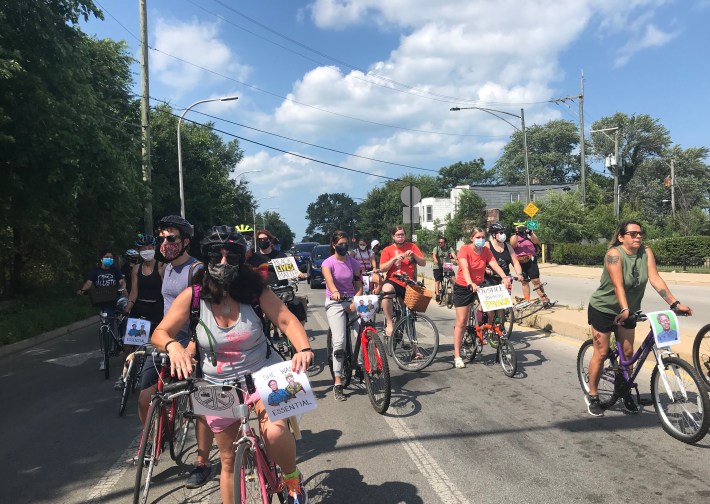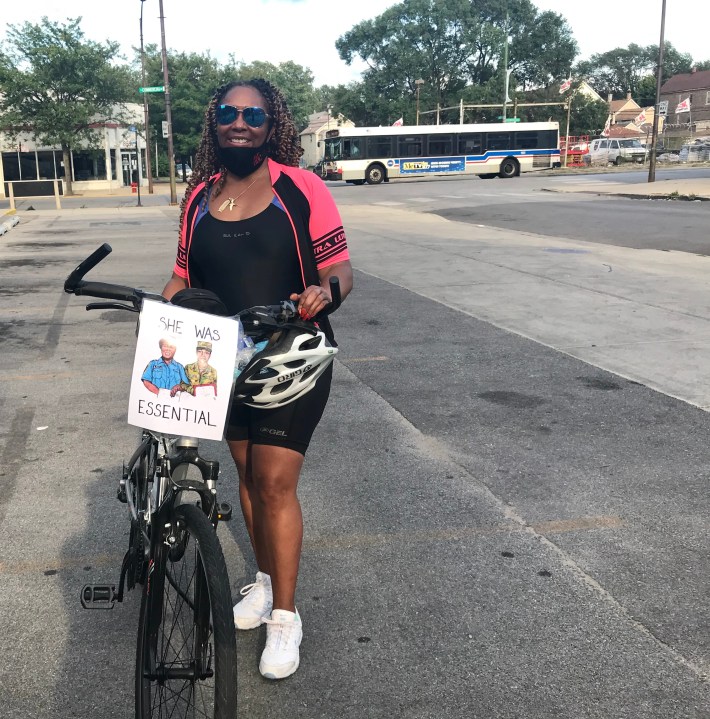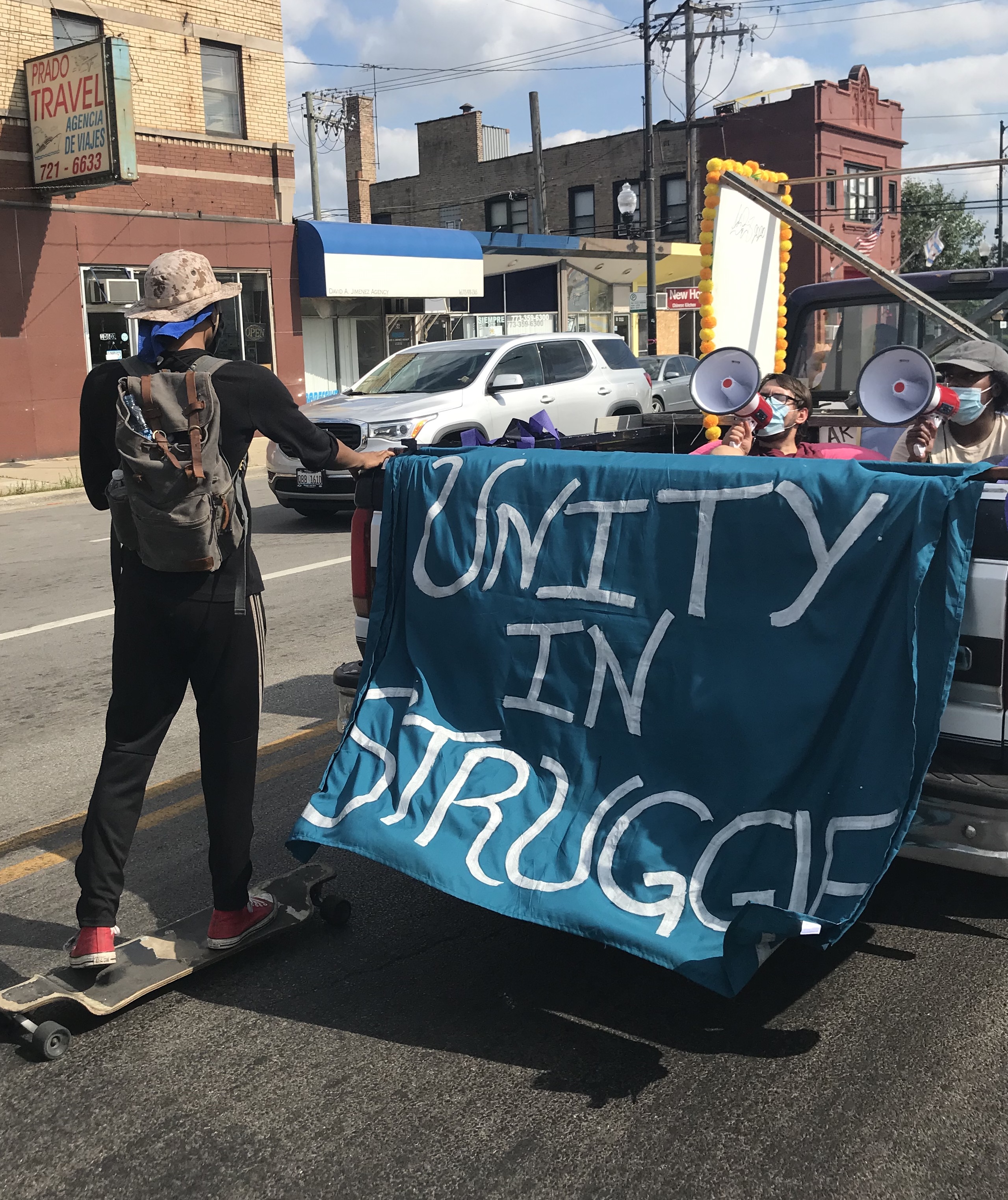Content Warning: This article briefly mentions interpersonal violence
Early Sunday morning, I woke up with an excitement that set the tone for the day. I was going to the CommUNITY Bike Protest for Vanessa and Breonna, organized by newly formed justice collective Bridges // Puentes: Justice Collective of the Southeast — my first community bike protest and first ride through some of the South Side.
[Editor’s Note: Breonna Taylor was a young African American woman who was shot in her bed by three Louisville police officers. Officers Jonathan Mattingly, Brett Hankison, and Myles Cosgrove have not been charged in connection with Breonna Taylor’s death. Vanessa Guillen was a young U.S. Army soldier who was sexually assaulted and killed by a fellow soldier on the base of Fort Hood, an army post with one of the highest rates of murder, sexual assault, and harassment in the Army.]
Since I began riding three years ago, I have mainly been a solo rider. But recently, and especially as the pandemic and protests hit, I’ve come to see the value and camaraderie community riding brings.Bike protests and cycling groups have emerged as ways to advocate for safer public spaces, stand up against police brutality and honor those lost to government powers, in this case Breonna Taylor and Vanessa Guillen.
The community ride, led by Black and Brown women cyclist organizers from the area who used the name “Vanessa,” brought a cozy crowd to honor both women with four rest stops and teach-ins along the route from Mission Cannabis Dispensary in South Chicago to Eggers Grove in East Side. We were lucky to have a few bike marshals along the ride. Bike marshals (some who have been targeted by police) are present at protests to create a safety barrier from police and traffic. Ride organizers said the protest was to “make it clear that we will not tolerate state violence, or any kind of violence, against women” and to call out systemic racism that has especially plagued disinvested Chicago neighborhoods.
Sam Corona, an organizer with Bridges // Puentes and with the Southeast Environmental Task Force, said the new group started out of a desire to organize more activism work aside from marches after seeing the positive community response to their march on Commercial Avenue to rebuild the neighborhood after looting at the end of May. Many folks in the community wanted to organize, clean up, and connect the Black and Latino community and CPD in the area.

Corona, who grew up in The Bush near South Chicago, said the social justice collective focuses on the array of issues in the community, like environmental racism, pollution, structural racism and education disinvestment.
“Our idea was building bridges to our community and trying to make every community understand that every single issue has a larger, stronger presence and deeper roots in our community,” Corona said.
As a father and a veteran, Guillen’s murder hit Corona personally. And to know that the Fort Hood army station has seen eight deaths this year that were uncovered after Guillen’s death, it’s clear the army isn’t protecting its soldiers, in the same way police officers aren’t protecting Black and Brown people. “I am a father so I have to worry about my daughter growing up in this type of world and if the resources that are supposed to be there to protect her and save her [do not], then my hope is not really there,” he said.
Leading chants and sharing his personal experience with the crowd during the bike ride, Corona later said real reform and justice is needed to change these government systems that have taken so many lives, like creating independent task forces to investigate murders and hold officers accountable. The same demands from Black Lives Matter activists have dominated protests, calling for enactment of the Civilian Police Accountability Council and defunding the Chicago Police Department.
The ride was also important for the community because police have long limited mobility and freedom in public spaces for minorities. Its action was a defiant way to take back the streets and put the power into the community, not the system. The second monthly bike ride from the collective was not only aimed at justice but creating more public safety.
“Creation of systems of safety — that is the only way we are going to uproot and stop this structural violence we are facing,” said one of the Vanessas, who was born and raised in South Chicago.
Riding near Vanessa in Calumet Park, who was playing music from a loudspeaker with her fist raised in the air, the energy of the ride was contagious. The protest was a powerful unity that attracted drivers, bikers and people hanging at the park, who all honked in solidarity and chanted back.
At the park teach-in, speakers shared historical knowledge about the park, facts about Breonna and Vanessa’s deaths and the importance of their essential work that was cut short to highlight the treatment of minority women (especially women serving in the U.S. military). Jocelyn, a participant, shared a moving poem about her experience as a Black woman and an essential worker. You can watch a stirring video of her reciting this poem here.
“Who is to say I am not the next Black woman murdered and seen on the next news broadcast? This question lines my heart, my body, my soul without any explanation or reason, just as so many other families are suffering from this today,” she said. “It’s [these] unsettling and unjustified killings going on so because of this, I will march on, I will push through and because of this I will forever say their names.”
Hearing these stories, meeting an array of diverse people eager to connect, and witnessing the smart organization of the ride to make sure safety came first was an unforgettable experience as a journalist and cyclist. Similarly, the inclusivity and organization of the ride was what Debbie Donaldson from Blue Island liked most. An active spin cyclist and yearslong outdoor rider, she said it was her first Black Lives Matter protest and she went because she wanted to bike in a group and show support for the cause. Now, she said she is eager to attend more bike ride protests with the community.
“I felt more included, I felt safe and was just glad to be able to participate in something that can help bring change,” Donaldson said.

Forty miles later, with new knowledge and new friends made, Sunday’s bike protest was a great example of the cycling community’s power and how biking can serve as a form of advocacy, organization, and inclusivity that can assist Chicagoans in speaking up for social justice.
You can follow Ariel at ArielParrella on Twitter.




